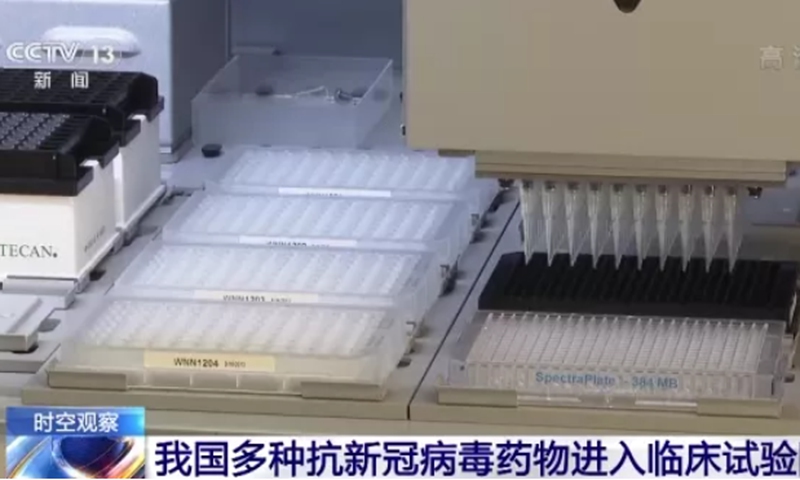
Photo: Screenshot of CCTV News
Chinese researchers keep making progress in R&D on anti-COVID drugs, with two oral candidates initiating clinical trials soon and a monoclonal antibody drug in phase III clinical trial.
The VV116, an oral anti-SARS-CoV-2 nucleoside candidate jointly developed by the Shanghai Institute of Materia Medica (SIMM) of the Chinese Academy of Sciences (CAS) and the Wuhan Institute of Virology, is going to be evaluated in a clinical study to treat COVID-19, media reported on Sunday.
The candidate drug can largely reduce the load of virus in rats and proved to be safe according to data from animal trials, according to media reports.
The drug is undergoing clinical trials on the Chinese mainland and will also initiate trials in Uzbekistan, Shen Jingshan, a researcher from the SIMM, told local media The Paper.
The C402234, another drug developed by the SIMM is a peptidomimetic compound designed and synthesized through the analysis of the crystal structure of the Mpro enzyme of the coronavirus.
The Mpro enzyme plays a critical role in SARS-CoV-2 replication and it is conservative in all coronaviruses. Human doesn't express an enzyme as the Mpro of SARS-CoV-2, making Mpro to be a superior target to develop anti-SARS-CoV-2 inhibitors. Although a few inhibitors of the Mpro have been reported, their anti-viral activities are only determined in vitro, according to a report from the CAS.
On March 15, Phase I clinical trial of the candidate was initiated at the Frontage Phase I Research Center in the United States, according to the CAS.
The Institute of Microbiology under the CAS has also developed an antiviral drug for COVID-19, called JS016. It is now under phase-III clinical trials and has been used for emergency treatment, both domestically and overseas.
The JS016 is a human monoclonal antibody that targets the SARS-CoV-2 spike protein and blocks the binding of the virus to host cells. The antibody was identified by screening B cells from convalescent COVID-19 patients, Yan Jinghua, a researcher from the CAS Microbiology Institute told media.
Data from Phase II clinical trials proved that the candidate can reduce the risk of medium cases from transitioning to a severe condition, Yan said.
According to Yan, 3,000 doses of the drug were used to treat patients in recent flareups and 500,000 doses were also allocated for the international community for emergency use.
The monoclonal antibody is a kind of neutralizing antibody that can block the virus from binding with cells in the human body, Zhuang Shilihe, an immunology expert based in Guangzhou, South China's Guangdong, told the Global Times.
Usually, antibiotics are used to treat mild- and medium- patients. But monoclonal antibody drugs can also be used to suppress immune responses to help treat hyper-inflammation in severe cases, Zhuang explained.
